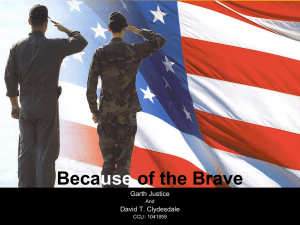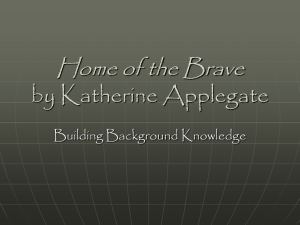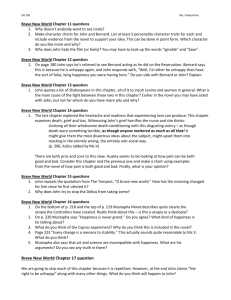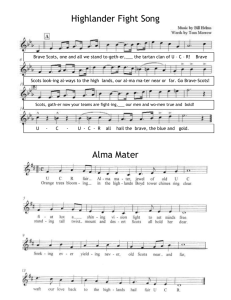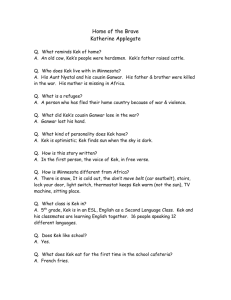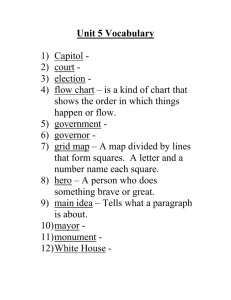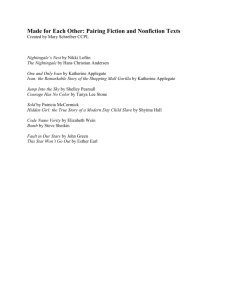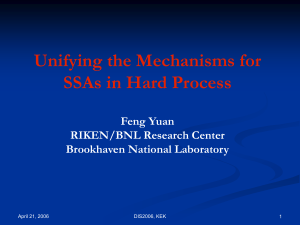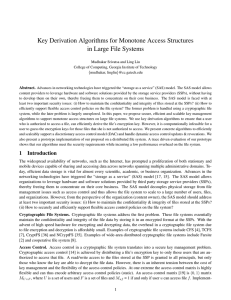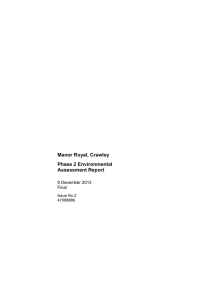Teacher's Guide: Home of the Brave
advertisement
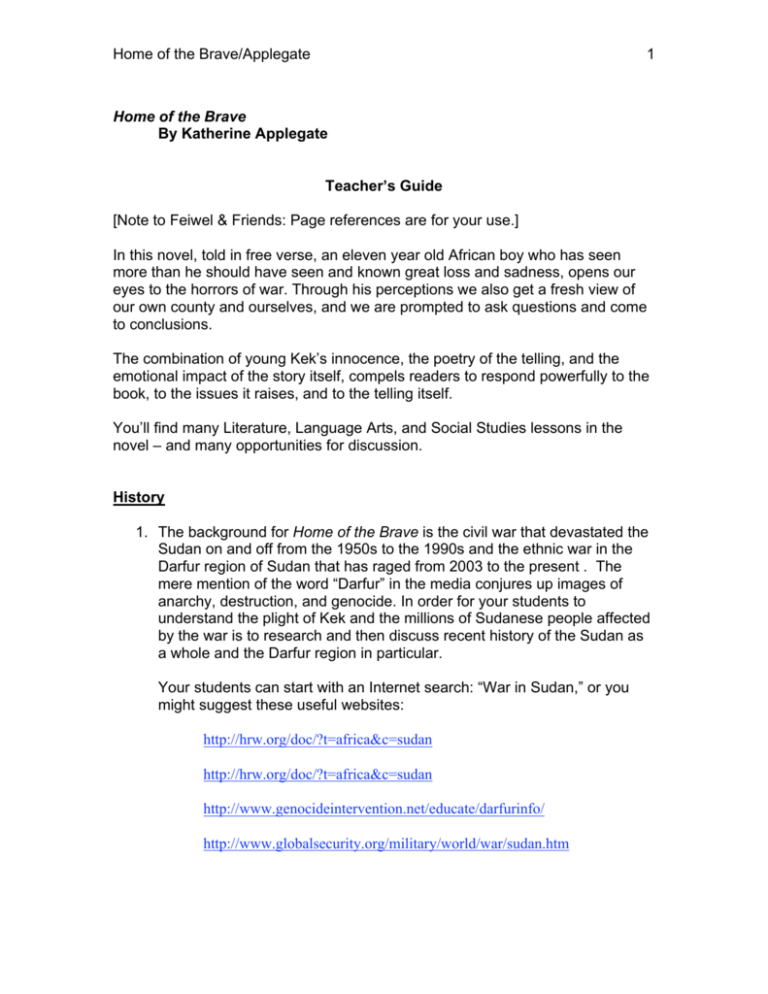
Home of the Brave/Applegate 1 Home of the Brave By Katherine Applegate Teacher’s Guide [Note to Feiwel & Friends: Page references are for your use.] In this novel, told in free verse, an eleven year old African boy who has seen more than he should have seen and known great loss and sadness, opens our eyes to the horrors of war. Through his perceptions we also get a fresh view of our own county and ourselves, and we are prompted to ask questions and come to conclusions. The combination of young Kek’s innocence, the poetry of the telling, and the emotional impact of the story itself, compels readers to respond powerfully to the book, to the issues it raises, and to the telling itself. You’ll find many Literature, Language Arts, and Social Studies lessons in the novel – and many opportunities for discussion. History 1. The background for Home of the Brave is the civil war that devastated the Sudan on and off from the 1950s to the 1990s and the ethnic war in the Darfur region of Sudan that has raged from 2003 to the present . The mere mention of the word “Darfur” in the media conjures up images of anarchy, destruction, and genocide. In order for your students to understand the plight of Kek and the millions of Sudanese people affected by the war is to research and then discuss recent history of the Sudan as a whole and the Darfur region in particular. Your students can start with an Internet search: “War in Sudan,” or you might suggest these useful websites: http://hrw.org/doc/?t=africa&c=sudan http://hrw.org/doc/?t=africa&c=sudan http://www.genocideintervention.net/educate/darfurinfo/ http://www.globalsecurity.org/military/world/war/sudan.htm Home of the Brave/Applegate 2 Questions to consider are: · What is the ethnic make up of Sudan? · Why were the wars fought? · Who was fighting whom? · What role did the Sudanese government play? · What happened to the people? · How did the world community respond? · What were the consequences? Literature 2. Katherine Applegate tells us the story of Home of the Brave as a firstperson narrative free verse poem. Start your study of the poetry of the novel with a question for your class: How does the poetic form of the novel help us see the world through Kek’s eyes? On the very first page of the book, phrases like “flying boat,” and “the helping man” not only reveal Kek’s innocence and inexperience with the English language, but are also poetic. They make us see the airplane and Dave differently than if the author had used the words “airplane” and “relief worker.” Poems use words carefully, each chosen for many reasons – its sound, meaning and rhythm. Ask your students to keep a list of such words and phrases that they discover as they read the novel. They should define them using conventional language, and make notes about how the words/phrases differ, even though they mean the same thing. Have your students create poetic phrases. Make a list of objects, terms, and phrases they come in contact with in their everyday lives. Then have the students redefine them in poetic terms. For example, an iPod® could be “the singing box.” Put the students’ terms along with the ones they find that Kek uses in Home of the Brave together and create a class dictionary of poetic terms. Your students will now have a new resource to use for when they write their own poems and stories. Social Studies – Immigration [Page 5] 3. This America is hard work. This is one of Kek’s first realizations, and it is one of the themes of the novel. Have your students discuss what Kek means by this statement. Talk with them about why it is so hard even though many people think that Americans have it too easy. How is it especially hard for newcomers to the United States? Home of the Brave/Applegate 3 [Page 148] 4. There are students from all over the world in Kek’s ESL class. He ponders: Of all the things I didn’t know about America, this is the most amazing: I didn’t know there would be so many tribes from all over the world. How could I have imagined the way they walk through world side by side without fear all free to gaze at the same sky with the same hopes? America, the land of hope. To Chinese immigrants in the late 1800s it was called the “Golden Mountain.” At the turn of the 20th century, Jews from Eastern European countries called it the “Golden Medina.” In the displaced person’s camp that Kek was sent to they called America “Heaven on Earth.” [Page 25] Regardless of what it is called, poor oppressed immigrants envisage America as the place to go to escape oppressors, find riches, and create a new life. There are many immigrants like Kek, Ganwar and Kek’s aunt, whose plights are so dire that American relief organizations with workers like Dave, the “helping man” in Home of the Brave, bring here for humanitarian reasons. But countless others have to make their own way and cross our borders illegally to find the hope that America promises. The issue of immigration is a topic that is being debated in our government and throughout our country. What are we to do? Have your students discuss the issues. Questions to consider are: · Should we make it easier for people to immigrate to America or enforce stricter quotas? · Do immigrants add to the economy or take jobs away from American citizens? · Should illegal immigrants be allowed to stay in America and seek to gain legal status or be sent back to their home countries? After these and other issues are debated, your students should come up with a proposal to be voted on. They can campaign for their points of view with persuasive speeches and posters which can be hung up around the classroom. Then, hold a referendum. They should vote for what they Home of the Brave/Applegate 4 believe in. The result should be put forth as a resolution and sent to your local congressional representatives: “Resolved, we the students of class___ believe________.” They might want to extend the activity and bring the campaign to the rest of the school. [Page 62] 5. Kek puts on a t-shirt and a pair of blue jeans. In the bathing room I look hard in the shiny glass. I wonder if I look like an America boy. Kek is no different than any other immigrant who comes to America. He has the need to belong, to feel accepted and to be an American. Is there such a thing as an “America boy?” Have your students discuss what they think an American id and what an American looks like. Ganwar tells Kek that he’ll never really “feel like an American.” [Page 87] “…Because they won’t let you.” Who is the “they” that Ganwar refers to? What is the nature of his cynicism? Do your students agree with him? Do Americans try to keep out immigrants from the mainstream of society? 6. Read with your class Emma Lazarus’ poem “The New Colossus,” which is engraved on a plaque at the base of the Statue of Liberty. Discuss the meaning of the poem. Have them write compositions as to whether America is living up to the call of the poem. You can find the poem on line at: http://www.libertystatepark.com/emma.htm Language Arts 7. Language helps us not only to communicate, but also to understand the world around us. We are helpless in a society, if we cannot speak its language. As someone learns a new language, there is more to master than just vocabulary and grammar. There are odd phrases that simply do not make literal sense. These are idioms, and we use them everyday. When Kek is faced with idioms, his response is often funny to us and to others in the book. He is sometimes bewildered. Home of the Brave/Applegate 5 Look at some of these instances in the novel: · Page 60 – “The kids will eat you alive.” · Page 108 – “You need some time to get your feet wet.” · Page 115 – “Meantime, keep your eyes open.” Now, explore idioms with your students. How many can they list? Then, go to the website: http://www.sky-net-eye.com/eng/dictionary/english/idioms/american. The children can search the over 8000 idioms and compile a classroom list of 50-100 of their favorites. Write each idiom on a small slip of paper, fold it, and put the papers into a fishbowl or hat. Have each student pick one out at random. First they should determine the meaning of the idiom. Once they understand “their” phrase, they should use it throughout the next couple of days in school. They may have to force it into a conversation. They might develop a dialogue or a play to perform with some classmates that uses the idioms in funny ways. 8. Each part of Home of the Brave begins with an African proverb. Proverbs have special meanings to the cultures from which they come, but they are universal in nature. Discuss with your students the meanings of the five proverbs found in the novel. Then ask them to bring in proverbs, sayings, or words of wisdom that come from their own cultures. Make a collection of the sayings on index cards and once a week during the course of the school term have a student select a card to read to the class. Music [Page 29] 9. My people are herders. We move with the seasons, …We cannot carry much with us, and so our stories don’t make their homes in heavy books. We hold our stories in our songs. Kek’s people had an oral tradition. Their stories told of the stars and the wind, of love and betrayal, of war and regret. Have your students create oral presentations of their experiences, thoughts and ideas. Then they should set them to music. They can use Home of the Brave/Applegate 6 existing tunes or make up their own music using the styles they prefer: rock, rap, folk, pop, R&B, ska, etc. Have students share them with their classmates and then travel around the school and perform for other classes. Responding to Literature: Themes in Home of the Brave 10. Kek feels guilty that he ran and left him mother behind. But he also knows that the only reason he survived is that he ran. Ask the class to discuss the following questions: Does Kek think he did the right thing? What does Ganwar tell Kek about what he did? What did Kek’s mother want him to do? What would your students have done in a similar situation? Would they run or stay behind with their mothers? [Page 155-156] 11. Hannah takes Kek to the grocery store to buy food for her foster mother. The grocery store had rows and rows of color, of light, of easy hope. …I stand like a rooted tree firm, my eyes too full of this place, with its answers to prayers on every shelf. …I reach out and touch a piece of bright green food I’ve never seen before. And then I begin to cry. Discuss with your children Kek’s emotional reaction when he sees the shelves lined with food. Do your students take this surfeit for granted? How much is too much? Do we need dozens of varieties of breakfast cereal and a half dozen kinds of cola? 12. Gol is a cow, but Katherine Applegate also uses her as a symbol. Ask you students how Gol represent Kek’s past, present, and future. 13. What are the most important things that happen to Kek in his first year in America that make him begin to feel at home? Have your students Home of the Brave/Applegate 7 prioritize the list below from the most to the least. They should add to the list other things they think are important. · · · · · · · Clothes Friendships Teacher Trip to the mall Taking the bus TV Social worker Students can also make a list of the hardest things that Kek has to adjust to in this year and place them in order of hardest to easiest. 14. As a final discussion, talk about why Katherine Applegate titled the novel Home of the Brave. Cooperative Learning [Pages 131-132] 15. To help the students in Kek’s ESL class get to know each other they play a game called Interview. Your students can play the game too. Use a cardboard tube as a microphone. A students stands in front of the class and says five things about him/herself. Then each member of the class interviews the student by asking him/her a question. When you are finished, your students will have a better understanding of each other. Final Activity 16. Now that your class has read an incredible story about one boy surviving the atrocities in his country, they are sure to ask themselves what they can do to help. There are many organizations doing relief work to aid the civilians in Darfur. Some of them are: · Aid Darfur http://www.aiddarfur.org/site/c.ntJ2IeMTLuG/b.2257329/k.BF09/Home.htm · Oxfam America http://www.oxfamamerica.org/whatyoucando · Catholic Relief Services Home of the Brave/Applegate http://crs.org/darfur/ · Genocide Intervention Network http://www.genocideintervention.net/donate/ Your students may find ways to raise money to help in this humanitarian effort. This guide was created by Clifford Wohl, Educational Consultant 8
